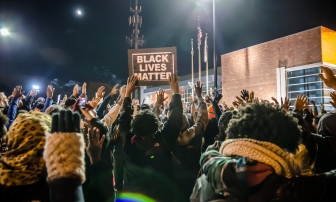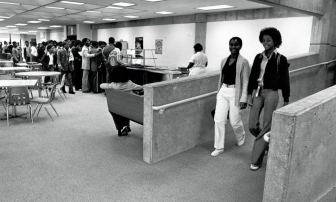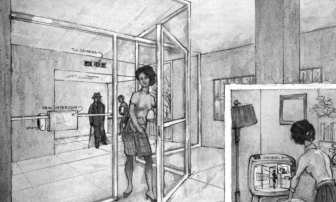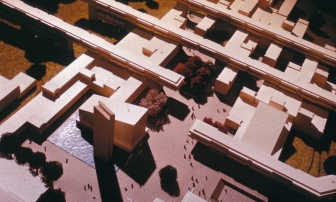Fair Policing for the Fair City?
Three years ago, we began our intergenerational participatory action research collective, the Researchers for Fair Policing. This name reflects our hopefulness and our desire for thinking through what “just policing” might look like in our neighborhoods. Researchers for Fair Policing is a collaboration of researchers from Make the Road New York, a member-led organization that builds the power of Latino and working-class communities through organizing, policy work, education, and services, and the Public Science Project, a collective of professors, students, artists, and organizers from the Graduate Center, City University of New York (CUNY); John Jay College of Criminal Justice, CUNY; and Pratt Institute. We have conducted participatory community-based research on educational inequity, community change, and criminal justice for over a decade.
We were motivated by a desire to understand young people’s everyday experiences with, and attitudes toward, the police, and to envision what “fair policing” might look like in our neighborhoods. Our participatory action research documents the human cost of the New York Police Department’s (NYPD) long history of Broken Windows (order maintenance, zero tolerance) policing policies, and offers key considerations for reframing what we mean by “community safety.” We have collected surveys from over 1,000 young people that offer new relevant findings about the everyday experience of growing up black and brown with Broken Windows policing. What’s more, we have created an archive of young people’s testimonials of their encounters with the police, a documentary short video, public exhibitions, and an interactive website and social media campaign that is currently in progress.
Broken Windows policing was originally adopted by the NYPD as “Police Strategy No. 5: Reclaiming the Public Spaces of New York,” written by Rudolph W. Giuliani and William J. Bratton in 1994. It drew from an article published in The Atlantic in 1982 by George L. Kelling and James Q. Wilson.1 Relying upon the frequent use of surveillance practices such as “stop and frisk,” asking for IDs, or preventing people to assemble publicly by asking them to “move along,” Broken Windows aggressively polices minor offenses to maintain “order.” Our research demonstrates the opposite—that Broken Windows policing itself produces “disorder” by severing community relationships and creating a hostile environment in public spaces. This is demonstrated in the compelling testimony by Make the Road New York youth organizer Markeys, who says, “It makes me feel like I shouldn’t even come outside anymore if I’m just gonna get harassed by a policeman that’s supposed to be protecting me.” Second, we argue that the “disorder” that Broken Windows policing seeks to “contain” is a deep structural issue that would be best addressed within and by communities, using an assets-based approach to strengthening communities and building capacity.
What does it mean to grow up black and brown in the over-policed, gentrifying, still disinvested neighborhoods of New York City? Now one of the most expensive regions in the country, New York offers a contradictory context for Broken Windows policing. New York today is a far cry from the disinvested city it was in the early 1990s. This begs the question of how this theory of policing is still relevant in a reinvested context. If Broken Windows policing is a racialized strategy for social-spatial control, we need to understand how this functions in gentrifying New York City. One of our team members, Brett G. Stoudt, has created a video short where he maps the NYPD’s own data in the Geography of Stop & Frisk, revealing what he calls the “scars of our city” and the uneven landscape of urban surveillance.
To better understand the impact of Broken Windows policing in New York City, we invite you to preview video testimonials produced by and for young people of their experiences of being policed. All of the testimonials are relevant, but we recommend that you click on the following ones that reveal the impact of Broken Windows policing on our community’s public spaces:
Researchers for Fair Policing | What Did We Do?.
Researchers for Fair Policing | You Look Like You've Been Doing "Bad Things".
Researchers for Fair Policing | Makes Me Feel Like I Shouldn't Even Come Outside Anymore.
These videos make clear that young people’s experiences of over-policing are intimately connected with other experiences of dispossession. At the same time that young black and brown people are being policed on an everyday basis, rents are going up and families are being displaced from their neighborhoods. There are increases in school discipline and suspension rates, stagnating low graduation rates, and few living-wage jobs. This intense policing and heavy surveillance contribute to an overall feeling of dispossession and the sense that people no longer feel as if they have rights to, or ownership of, their communities.
We also invite you to watch the participatory youth documentary short we produced, “Who’s Impacted by Stop & Frisk?” It elaborates another one of our key findings: The everyday experience of policing impacts the whole community. Policing not only is focused on young men and women of color, but also is experienced collectively as a community under siege. Our research demonstrates the aggressive police presence in the everyday spaces of people’s lives, most importantly the home, school, and neighborhood public spaces, key sites of social reproduction. Our research also shows the impact of policing upon family members, mothers who worry about their sons, little brothers and sisters watching their big brother handcuffed, and grandmothers who are tired of opening the door to the police.
Researchers for Fair Policing hopes to shed light not only on the social and spatial exclusions of the neoliberal city, but also on the potential for resistance to these forms of exclusion. The young people we work with are organizing politically, protesting, and educating other young people about their rights. We invite you to join us in the struggle for the right to our city—the right to New York City!
Researchers for Fair Policing is an inter-generational team of researchers from Make the Road New York & the Public Science Project including: Caitlin Cahill, Brett G. Stoudt, María E. Torre, Jose Lopez, Kimberly Belmonte, Selma Djokovic, Keeshan Harley, Amanda Matles, Adilka Pimentel, and Justin Rosado.
We are very thankful for the support of the Adco Foundation; Antipode Foundation; Graduate Center, CUNY; Institute for Human Geography; John Jay College of Criminal Justice, CUNY; Pratt Institute; Taconic Fellowship, Pratt Center for Community Development; and the Sociological Initiatives Foundation.
✓ Not peer-reviewed
Caitlin Cahill, Brett G. Stoudt, María E. Torre, Jose Lopez, and Researchers for Fair Policing, “Fair Policing for the Fair City?,” Aggregate 3 (March 2015), https://doi.org/10.53965/VYQF9569.
- 1
Rudolph W. Giuliani and William J. Bratton, “Police Strategy No. 5: Reclaiming the Public Spaces of New York” (New York: City of New York, 1994), accessed February 4, 2015, https://www.ncjrs.gov/pdffiles1/Photocopy/167807NCJRS.pdf; George L. Kelling and James Q. Wilson, “‘Broken Windows,” The Atlantic, March 1, 1982, accessed February 4, 2015http://www.theatlantic.com/magazine/archive/1982/03/broken-windows/304465/.
↑



